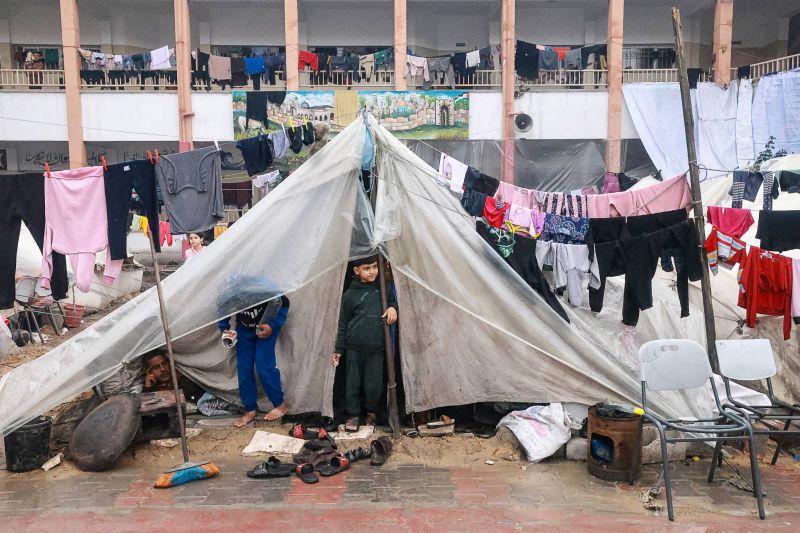
Palestinian boys stand in their makeshift tent at a camp set up on a schoolyard in Rafah in the southern Gaza Strip where most civilians have taken refuge, on Dec. 13, 2023, as battles continue between Israel and the Palestinian militant group Hamas. (Credit: Mohammed Abed/AFP)
RAFAH — Strong wind and heavy rain in Gaza overnight on Wednesday brought even worse misery to displaced families, tearing and flooding flimsy tents, drenching clothes and blankets and making everyone cold.
At a tent camp in Rafah, located on sandy terrain strewn with rubbish, people were trying to recover from a horrible night, carrying buckets of sand to cover puddles inside or just outside their tents, and hanging up soggy clothes.
Some families have proper tents, but others are making do with tarpaulins or thin, see-through plastic made to protect goods, not provide shelter for people. Many tents have no ground-sheets, so people spent the night huddling on wet sand.
"It is torn and water poured on us. We were drenched," said Ramadan Mohadad, a middle-aged man who was trying to fix his family's shelter fashioned from strips of plywood and a thin plastic sheet.
Mohadad's white t-shirt with stripes had large wet patches around the collar and on both shoulders.
"We tried as much as we could to protect ourselves so water would not get through but rain got in ... This plastic does not protect people sleeping under it," he said.
Rips were visible in other families' plastic shelters, and some showed puddles inside. One family had placed a cement block at the entrance to act as a sort of dam, as well as smaller bricks inside that looked like stepping stones.
Yasmin Mhani said she had woken up in the night to find her youngest child, who is seven-months old, soaking wet. Her family of five are sharing a single blanket after their home was destroyed by an Israeli air strike and they lost one of the children, as well as all their possessions.
"Our house was destroyed, our child was martyred and I remain facing it all. This is the fifth place we have had to move to, fleeing from one place to another, with nothing but a t-shirt on," she said, hanging wet clothes outside her tent.
Another woman and mother of two, Aziza al-Shabrawi, tried in vain to get the rainwater out of her family's tent, lamenting that her children must live in such precarious conditions.
"My son is sick because of the bitter cold and my daughter is barefoot. It's like we're beggars," said the 38-year-old. "No one cares, and no one helps."
Shabrawi is among some 1.9 million people displaced during more than two months of war, half of them children, with many fleeing to southern Rafah following orders from the Israeli military.
She was forced first to leave her home in the northern Jabalia refugee camp, reaching the southern city of Khan Younis, only to flee further to Rafah as Israeli troops pressed deeper into Gaza.
Bilal Abu Bakr, who fled from the coastal Al-Shati refugee camp, said he has no electricity or internet access to check the weather forecast.
"Suddenly, we were inundated by rainwater," said the 49-year-old. "We only have one blanket for nine people. We ask for the minimum — some mattresses, blankets, clothes for the displaced.
"We've forgotten the suffering of war, and we are now suffering from winter and the freezing cold, for how long?"
Fear of being pushed to Egypt
Rafah, next to the border with Egypt, is the southernmost part of the Gaza Strip, where people have been arriving in growing numbers to seek refuge from intense fighting between Israel and Hamas, now raging in both the north and south.
Inas, a 38-year-old mother of five, said she and her family had been forced to flee four times since the war started — first from the Twam area in northern Gaza City to the Tel al-Hawa neighborhood, then to Nuseirat refugee camp in central Gaza, then to the city of Khan Younis, and now to Rafah.
The family previously owned a five-floor house and a supermarket, which have been completely destroyed, she said.
"I hope the war ends and the Israeli occupation forces don't invade Rafah on the ground. I am terrified of the possibility of displacement to Egypt," she said, voicing a common fear among Gazans.
"That is our worst nightmare. Are they going to expand the ground war to Rafah? If that happens where should we go? To the sea or to Sinai?" she said, referring to Egypt's vast desert region just south of Gaza and Israel.
"We urge the world to stop Israel. We don’t want to leave Gaza," she said.
Israel denies having any plans to push Palestinians into Sinai, while Egypt has said it did not want a mass arrival of people from Gaza. However, the Gaza-Egypt border fence has been breached in the past, fueling fears that an uncontrolled displacement could happen this time.
Israel started its campaign to destroy the Hamas militant group that controls Gaza after its fighters stormed across the border fence on Oct. 7, killing 1,200 Israelis and seizing 240 hostages of all ages.
Since then, Israel's bombardment and siege have killed more than 18,000 people, mostly women and children, according to Palestinian health authorities, with thousands more feared buried in rubble.
heavy rain in Gaza overnight on Wednesday brought even worse
misery to displaced families, tearing and flooding flimsy tents,
drenching clothes and blankets and making everyone cold.
At a tent camp in Rafah, located on sandy terrain strewn
with rubbish, people were trying to recover from a horrible
night, carrying buckets of sand to cover puddles...